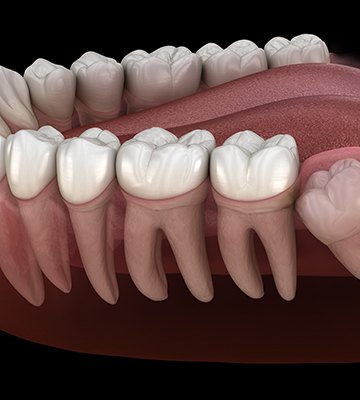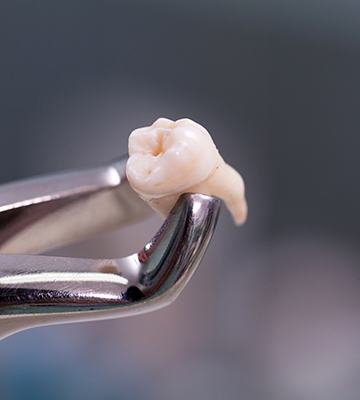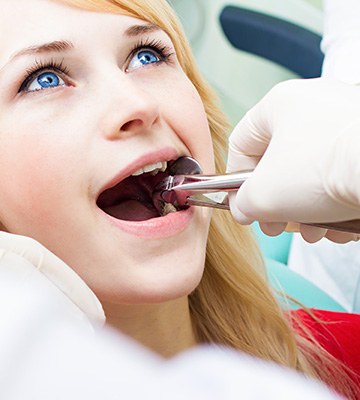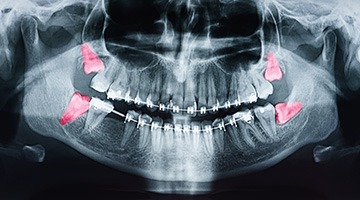Wisdom Tooth Extraction – Colleyville, TX
Saying Goodbye to Wisdom Teeth Before They Cause Problems
Wisdom tooth extraction is often viewed as a rite of passage for teens and young adults—but anyone can benefit from this useful procedure, especially if their wisdom teeth are likely to or are beginning to cause oral health issues. Continue reading to learn more about wisdom tooth extraction, and if you or a loved one needs to schedule a consultation, don’t hesitate to reach out today!
Why Choose The DFW Dental Implant Center for Wisdom Tooth Extraction?
- Dedicated implant Dentist and Prosthodontist
- Sedation Dentistry Options for Anxious Patients
- Insurance-Friendly and Financing Available
What Are Wisdom Teeth?

Wisdom teeth, sometimes called third molars, refer to the teeth found at the very back of the mouth, which usually begin to develop and erupt during the teenage years. Most people have four wisdom teeth total, one in every quadrant of their mouth—but in rare cases, some have fewer or more.
Our ancestors relied on their wisdom teeth to bite and chew their food, since their diets were much coarser and consisted of a lot of raw items. However, modern diets are much easier to eat, and humans have evolved smaller mouths over time, which means the wisdom teeth, no longer needed, don’t often have room to properly erupt.
Why Do Wisdom Teeth Need to Be Removed?

It’s true that not everyone needs to undergo wisdom tooth removal—there are some lucky patients out there who end up not having any issues whatsoever with their wisdom teeth! However, most people tend to need their wisdom teeth extracted before they begin to cause problems. A few of the most common reasons for wisdom tooth extraction include:
- The teeth are impacted, meaning they don’t have enough room to erupt correctly.
- The teeth are causing damage to neighboring teeth.
- They’re causing continuous pressure in the back of your mouth.
- They’re infected and causing swelling, pain, fever, or other symptoms.
- The teeth are likely to cause crowding or other future dental issues.
What to Expect from the Wisdom Teeth Procedure?

The wisdom tooth extraction procedure is surprisingly straightforward. After you’ve met with Dr. Branberg for your consultation, he’ll be able to determine if your wisdom teeth need to come out after inspecting your smile, taking X-rays, and discussing your symptoms with you. From there, a treatment plan is put together.
Partially erupted wisdom teeth can normally be loosened and then gently removed using specialized instruments; however, in the case of fully impacted wisdom teeth, a small oral surgery may be necessary. During this approach, the teeth are normally removed in sections to minimize the amount of bone loss and tissue disruption. In any case, our team will closely monitor you throughout the process and do everything we can to ensure your comfort and speedy recovery!
Recovering from Wisdom Tooth Extraction

After the procedure, gauze is placed over the surgical sites to help reduce bleeding. Blood clots will soon form over these sockets, and they play a vital role in protecting the underlying nerves and tissues as your mouth heals. This means you need to prioritize protecting your blood clots! Additionally, you can keep the following in mind to assist with your recovery:
- Don’t use a drinking straw, since the suction might disrupt your blood clots.
- Use cold compresses to manage any swelling.
- Avoid exercise or strenuous physical activity for the first week or so, as the increased blood flow can affect healing.
- Refrain from smoking, vaping, or using tobacco products since they can also interfere with healing.
Understanding the Cost of Wisdom Tooth Extractions

If your dentist has recommended wisdom tooth removal, this treatment is likely necessary to protect the health of your smile. Because each patient is different, the cost of wisdom tooth extractions will vary. The only way to receive an accurate estimate of the price is to visit your dentist at The DFW Dental Implant Center for a consultation. Until then, please feel free to take a closer look at some of the factors that can influence the cost of your treatment, as well as some financing options to make your care more affordable.
Factors That Can Impact the Cost of Wisdom Tooth Extractions

The cost of wisdom tooth extractions can vary depending on several factors that your dentist will discuss with you at your consultation. These include:
- How many wisdom teeth need to be extracted: Not everyone is born with four wisdom teeth. In fact, some people only have one, two, three or even five or six of them!
- Whether or not your wisdom teeth are impacted: Unfortunately, impacted wisdom teeth frequently require surgical intervention to remove. There are also two different types of impactions, bony impaction and soft-tissue impaction. Bony impaction requires the assistance of an oral surgeon to remove a tooth completely lodged in the jawbone, while soft tissue impaction is when your wisdom tooth is fully or partially emerged from the gums.
- The type of anesthesia/sedation required: This depends on whether you will need a surgical extraction or a simple extraction and typically incurs a separate cost.
Does Dental Insurance Cover Wisdom Tooth Extractions?

Not all dental insurance plans offer benefits for dental surgery; however, many will cover at least a portion of a wisdom tooth extraction procedure. This will depend on whether you’ve met your deductible or maximum for the year. The best way to learn about the specifics of your plan is to call your insurance company directly.
Other Options for Making Wisdom Tooth Extractions Affordable

In addition to accepting dental insurance and being proudly in-network with several popular providers, we are also happy to accept flexible financing through our preferred third-party financiers, CareCredit and LendingClub. To learn more about these options, please contact our office.
Wisdom Tooth Extractions FAQs
Are Wisdom Tooth Extractions Covered by Insurance?
Dental insurance providers typically cover a portion of the cost of medically necessary procedures, including wisdom tooth extractions. That said, plans vary from patient to patient, so it’s important to check the fine print on yours. If you need any help understanding your coverage or any restrictions that apply, like annual maximums, let us know! We’re happy to be in-network with several popular providers, and we gladly accept virtually all plans.
Why Are Wisdom Teeth Called That?
Since it’s common for the third set of molars to be more harmful than helpful, you might be wondering how they earned their nickname. The prevailing theory is that it’s due to when they emerge. While the first and second molars make an appearance early on, the third set usually grows in between the ages of 16 and 25. Since wisdom comes with age, they were called “wisdom teeth!”
How Should I Prepare for My Wisdom Tooth Extraction?
We discussed what to do during the recovery period above, but is there anything you should do before the procedure? The short answer is “yes!” To start, you should avoid smoking, drinking alcohol, and eating lots of sugary and acidic foods. We also recommend arranging for an adult you know and trust to drive you to and from our office. Lastly, pick up everything you need to heal comfortably at home, including cold compresses, soft foods, and OTC pain medication.
Is Wisdom Tooth Removal Painful?
This is hands-down one of the most asked questions about this emergency dental procedure. If it’s a question that has been circulating in your mind as well, then you’ll be happy to hear that the first step is always the same: to numb your mouth thoroughly. That way, you can relax comfortably in the treatment chair while we work to remove one, a few, or all of your wisdom teeth.
Important reminder: If you struggle with dental anxiety, you have a fear of needles, or your case is more complex, don’t hesitate to ask our dentist in Colleyville about nitrous oxide! This fast-acting form of dental sedation can alleviate worry and stress during your time in the treatment chair so your experience is a positive one.
How Soon Can I Eat After Wisdom Teeth Removal?
It’s important to wait at least an hour. That way, the gauze pads can stay in place. Plus, not eating right away also allows time for the numbing agent to wear off. After the bleeding has slowed down and you’ve regained full sensation in your mouth, you can eat, but you need to stick to a liquid diet for at least the first 24 hours. After that, you can progress to soft foods, like applesauce, plain yogurt, and cottage cheese. Around the one-week mark, you should be able to resume your usual diet.
